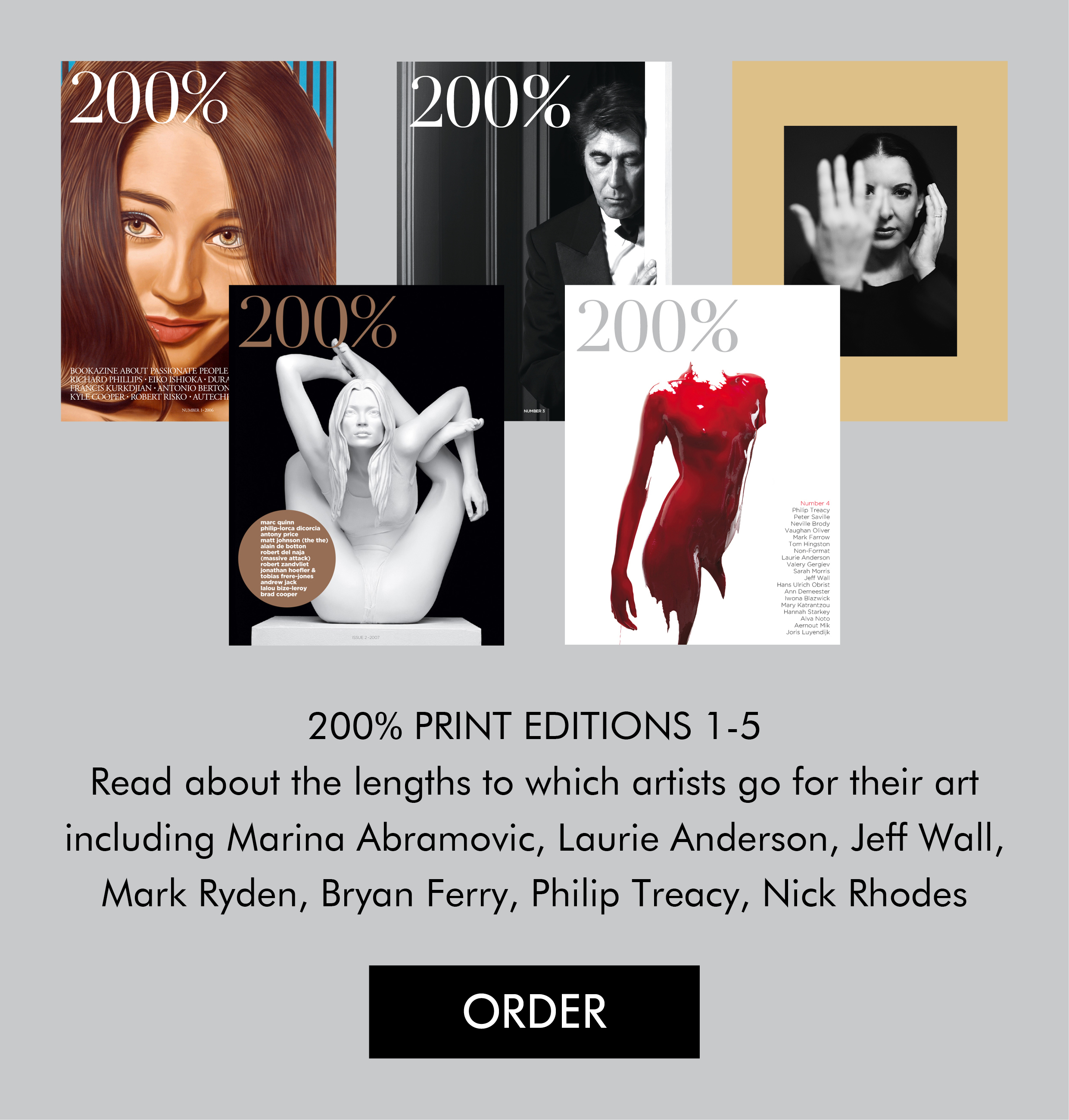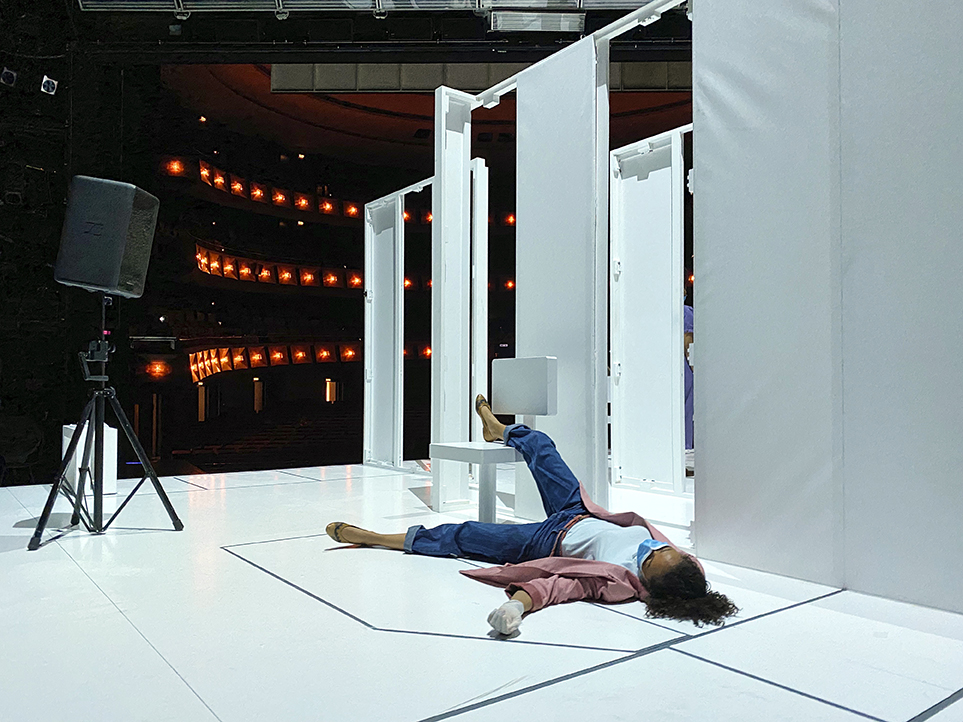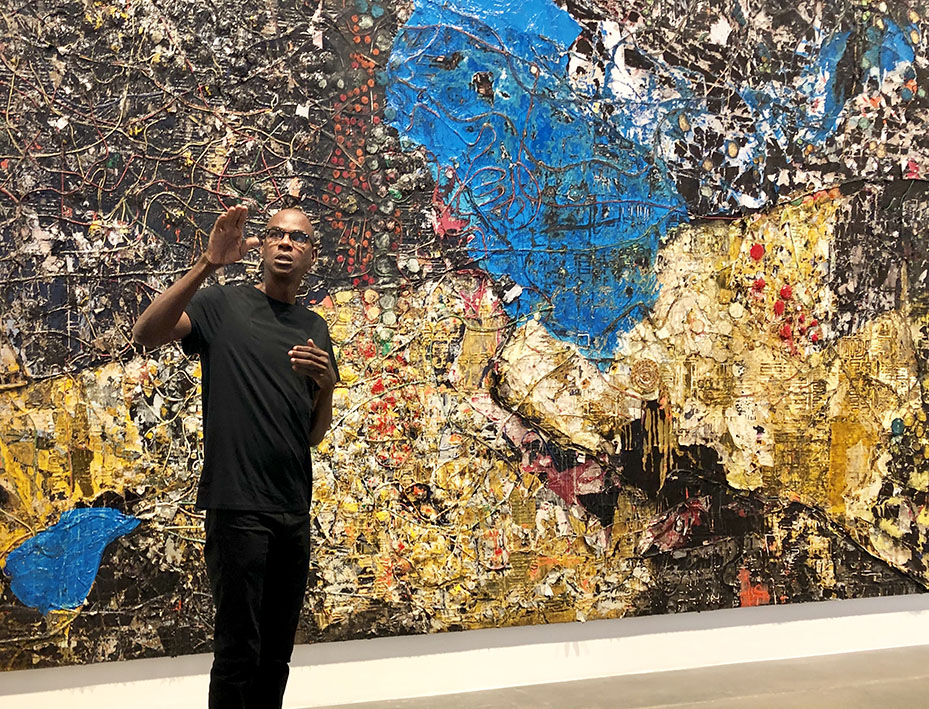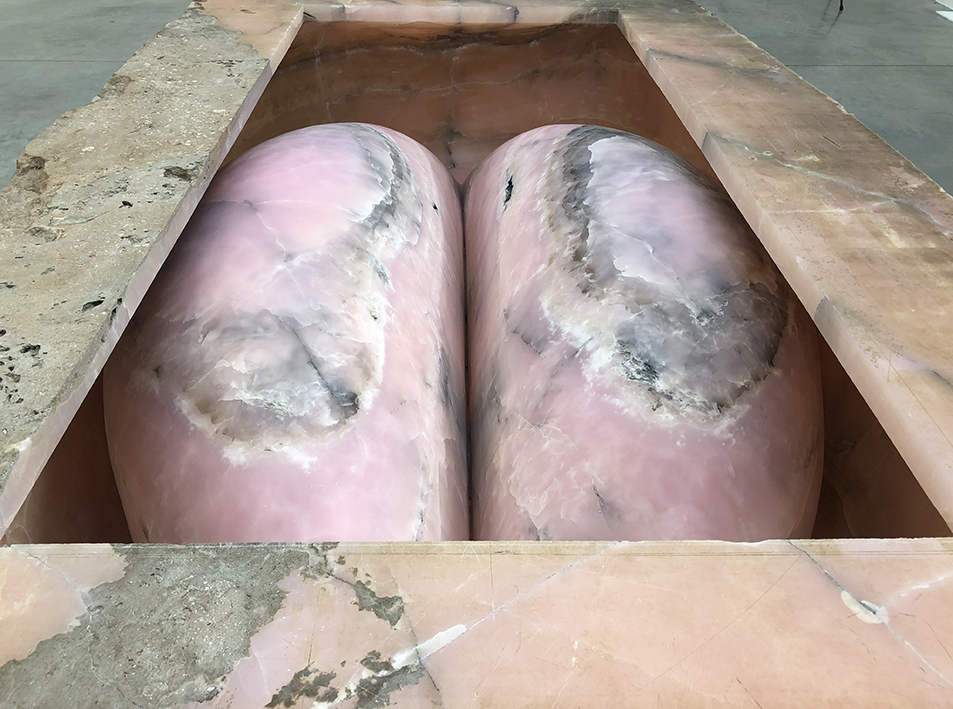 As well as the seven participants in Gillian Wearing’s ‘Self Made’ there is another person in the film who draws the attention – the Method Acting Teacher, Sam Rumbelow. In the film, Rumbelow helps the participants, via workshops, to access their memories and personal experiences to prepare them for short ‘End Scenes’ that reveal dramatic truths about themselves.
Rumbelow has been a Method practitioner for 10 years and runs a class at his Studio in East London. Although the participants had no real body of work or formal training, Rumbelow used the same techniques of Method that he applies in class to his students trying to unlock their true creative potential. He has commented that the participants’ willingness to work from their own humanity, has been the greatest asset of the film.
After the opening screening of ‘Self Made’, which was in early September at the Curzon in London, there was a Q&A session with Wearing, Rumbelow and one of the participants, Ash Akhtar. Rumbelow, who wasn’t wearing a cap, as he’d done throughout the film, was asked a lot of questions by the audience, as people are curious about Method and what it is he exactly does. In a previous post, he already explained about the thin line between the job of a psychotherapist and a Method acting teacher. In this interview he talks about how to ‘unlock’ people, two dramatic scenes in the film; ‘The Pig Kicking’ scene and the ‘Mussolini’ scene, intense moments of acting by Martin Sheen and Marlon Brando who went close to the edge to play their characters, and the heavy criticism by the press on ‘Self Made’.
200%: For four months you worked with Gillian Wearing to prepare the workshops and the filming of ‘Self Made’. Can you talk about the artistic exchange you have had with her?
Sam Rumbelow: From the beginning when we started to work together on the film, we had open discussions and an understanding that we should never second-guess ourselves. We should never do anything because we thought that we knew what was going to happen, as we wanted to create, to discover.
In my class, I tell my students that true creativity is to discover what you didn’t even realise was there. A good director creates an environment where his actors can really unlock something that they didn’t know what was there before. A really good director wants that to happen. They’ll want that film to end up being something that they never thought was possible when they started. For me, working with Gillian was determining how to we set up an environment, with workshops, that means that we’re not even in control; I don’t mean we’re out of control, but we’re not trying to produce, we’re not trying to shape or to censor. It’s to have an environment that we are simply engaged in the process of being creative.
200%: Using the Method Acting Technique the participants delved into their own memories, impulses, anxieties, fears, fantasies and inner resources. Were you personally overwhelmed by the feelings that the participants expressed in the film and thought “OMG this is heavy stuff”?
SR: The simple answer is ‘no’ as, for me, when people come alive that is inspiring, not dangerous. The only time I had to be concerned was if they became so overwhelmed by what they were feeling there was a danger that they may lose themselves to a certain degree. You have to be careful that you’re not pushing someone too far too quickly.
200%: In the ‘pig kicking’ scene, we see Ash losing himself as he goes close to the edge. For his story he consciously chose to do something that is not therapeutic but exclusively about himself. Can you discuss Ash’s story?
SR: Ash chooses to examine, creatively, what it is to be someone capable of doing a destructive act. The most destructive action he could think of was randomly kicking a pregnant woman in the stomach. Now, for us, this sounds very dramatic, but we see far worse on reality TV cop shows and we would say “Oh that’s great drama”. When we see an individual, though, consciously choosing to investigate destructive acts from an artistic perspective people become strangely effected by this in a way that they start to raise questions. I think that is a total double standard.
200%: In order for him to prepare for the scene where he randomly kicks a pregnant woman in the stomach, you organised a workshop where he had to kick a dead pig. How did you conceive this idea?
SR: The idea with the pig was a real practical consideration. If Ash feels that he can dramatise a destructive act, can he genuinely do it? Can we, on a practical level, find the means for him to be murderous with something. We considered different options: a mannequin, but it looks too dead. For obvious reasons, a human, or even a dead human, was out of the question: thus, I came up with the idea of a pig. In biological terms, pigs organs and their bodies are close to human beings.
The day we shot the scene we had a very demanding day so far, both on and off set. Dave was upset with being given some boots to wear, which was an idea to slowly build up the character of his Mussolini. So after talking it through with him, which was the first and only drama offset, Gillian and I were a little bit frazzled; until then everything had been so harmonious, so we were a little knocked off centre. We looked at each other and we both had a feeling: “Mmm, not sure if the pig kicking scene is such a good idea now”, as we were both feeling insecure. Then I said to her: “this film is about process. If we don’t do it we’re not staying true to our film’s intentions. We have to do it”.
So we started the scene. I remember I said to Ash “sometimes a good idea seems good at the time but it might not be” and I pulled off the cloth of the pig. Ash found it funny and he said “yes, I’m up for it”. Ash started to kick the pig. The only time it became worrying was at the point when he collapses on the floor and is crying: I said to him “look at the pig”, but he didn’t. When he wasn’t responding to me, I knew “ok he is quite powerfully overwhelmed here”. I looked at him and I saw he was right on the edge and to go any further would be destructive rather than creative: that’s when I said “right, let it go”.
As well as the seven participants in Gillian Wearing’s ‘Self Made’ there is another person in the film who draws the attention – the Method Acting Teacher, Sam Rumbelow. In the film, Rumbelow helps the participants, via workshops, to access their memories and personal experiences to prepare them for short ‘End Scenes’ that reveal dramatic truths about themselves.
Rumbelow has been a Method practitioner for 10 years and runs a class at his Studio in East London. Although the participants had no real body of work or formal training, Rumbelow used the same techniques of Method that he applies in class to his students trying to unlock their true creative potential. He has commented that the participants’ willingness to work from their own humanity, has been the greatest asset of the film.
After the opening screening of ‘Self Made’, which was in early September at the Curzon in London, there was a Q&A session with Wearing, Rumbelow and one of the participants, Ash Akhtar. Rumbelow, who wasn’t wearing a cap, as he’d done throughout the film, was asked a lot of questions by the audience, as people are curious about Method and what it is he exactly does. In a previous post, he already explained about the thin line between the job of a psychotherapist and a Method acting teacher. In this interview he talks about how to ‘unlock’ people, two dramatic scenes in the film; ‘The Pig Kicking’ scene and the ‘Mussolini’ scene, intense moments of acting by Martin Sheen and Marlon Brando who went close to the edge to play their characters, and the heavy criticism by the press on ‘Self Made’.
200%: For four months you worked with Gillian Wearing to prepare the workshops and the filming of ‘Self Made’. Can you talk about the artistic exchange you have had with her?
Sam Rumbelow: From the beginning when we started to work together on the film, we had open discussions and an understanding that we should never second-guess ourselves. We should never do anything because we thought that we knew what was going to happen, as we wanted to create, to discover.
In my class, I tell my students that true creativity is to discover what you didn’t even realise was there. A good director creates an environment where his actors can really unlock something that they didn’t know what was there before. A really good director wants that to happen. They’ll want that film to end up being something that they never thought was possible when they started. For me, working with Gillian was determining how to we set up an environment, with workshops, that means that we’re not even in control; I don’t mean we’re out of control, but we’re not trying to produce, we’re not trying to shape or to censor. It’s to have an environment that we are simply engaged in the process of being creative.
200%: Using the Method Acting Technique the participants delved into their own memories, impulses, anxieties, fears, fantasies and inner resources. Were you personally overwhelmed by the feelings that the participants expressed in the film and thought “OMG this is heavy stuff”?
SR: The simple answer is ‘no’ as, for me, when people come alive that is inspiring, not dangerous. The only time I had to be concerned was if they became so overwhelmed by what they were feeling there was a danger that they may lose themselves to a certain degree. You have to be careful that you’re not pushing someone too far too quickly.
200%: In the ‘pig kicking’ scene, we see Ash losing himself as he goes close to the edge. For his story he consciously chose to do something that is not therapeutic but exclusively about himself. Can you discuss Ash’s story?
SR: Ash chooses to examine, creatively, what it is to be someone capable of doing a destructive act. The most destructive action he could think of was randomly kicking a pregnant woman in the stomach. Now, for us, this sounds very dramatic, but we see far worse on reality TV cop shows and we would say “Oh that’s great drama”. When we see an individual, though, consciously choosing to investigate destructive acts from an artistic perspective people become strangely effected by this in a way that they start to raise questions. I think that is a total double standard.
200%: In order for him to prepare for the scene where he randomly kicks a pregnant woman in the stomach, you organised a workshop where he had to kick a dead pig. How did you conceive this idea?
SR: The idea with the pig was a real practical consideration. If Ash feels that he can dramatise a destructive act, can he genuinely do it? Can we, on a practical level, find the means for him to be murderous with something. We considered different options: a mannequin, but it looks too dead. For obvious reasons, a human, or even a dead human, was out of the question: thus, I came up with the idea of a pig. In biological terms, pigs organs and their bodies are close to human beings.
The day we shot the scene we had a very demanding day so far, both on and off set. Dave was upset with being given some boots to wear, which was an idea to slowly build up the character of his Mussolini. So after talking it through with him, which was the first and only drama offset, Gillian and I were a little bit frazzled; until then everything had been so harmonious, so we were a little knocked off centre. We looked at each other and we both had a feeling: “Mmm, not sure if the pig kicking scene is such a good idea now”, as we were both feeling insecure. Then I said to her: “this film is about process. If we don’t do it we’re not staying true to our film’s intentions. We have to do it”.
So we started the scene. I remember I said to Ash “sometimes a good idea seems good at the time but it might not be” and I pulled off the cloth of the pig. Ash found it funny and he said “yes, I’m up for it”. Ash started to kick the pig. The only time it became worrying was at the point when he collapses on the floor and is crying: I said to him “look at the pig”, but he didn’t. When he wasn’t responding to me, I knew “ok he is quite powerfully overwhelmed here”. I looked at him and I saw he was right on the edge and to go any further would be destructive rather than creative: that’s when I said “right, let it go”.
 200%: It sounds similar to the hotel room scene in ‘Apocalypse Now’ where Martin Sheen is facing his inner demons and also goes close to the edge.
SR: Yes, I think that Coppola needs a slap, that was really naughty of him. It’s like the story that Marlon Brando told about the famous scene in ‘Last Tango in Paris’ where he breaks down in front of his dead wife’s coffin and he becomes vitriolic. Brando has commented on that scene, that he was thinking about his mother what you call a ‘personalisation’. He created a reality and listened to how angry he felt as his mother, who is an alcoholic, neglected him. When Brando saw the movie, he felt he had been raped by Bertolucci, the director. He felt completely exposed. I think, though, “get over yourself. You knew what you were doing and you kept on doing it”. I feel that’s probably some of the best work that Brando has ever done as he came at it with such searing truth.
At the time when they were shooting the hotel room scene in ‘Apocalypse Now’, Martin Sheen clearly had demons and he was drinking the booze so he wasn’t in control of himself. When Coppola told him to go and look in the mirror, though, that’s such a provocative thing to do as you’re then creating an effect. You have to be careful about that as you don’t want to give the impression that it is legitimate to be excessive.
On the first day of Kramer vs Kramer, Meryl Streep was working with Dustin Hoffman and they had to shoot the scene where she breaks down; she can’t take it and she leaves the flat. In an interview with Jonathan Ross, she told him that, without warning, Hoffman slapped her hard in the face. I think the reason why Hoffman did it was that he could see that she was probably tense, nervous as he was a big star whilst she was a young and upcoming actress. She was probably skittish and he thought this would make her focus. The important thing is: It doesn’t matter actually what you do, but why you do it – that you believe your action has a creative result, that is really central to creativity.
There is a great story about a famous actor on stage who was an alcoholic, a very nervous man who was trying to make a come back. He was working with a young, aggressive director who was acting out a battle of egos. It was an Edwardian period drama so in the opening scene he directs the actor to be at the front of the stage as the curtain goes up, to be standing there with a cup and saucer in his hand. The actor was standing there, shaking like a leaf, and the cup was rattling. The actress who was working with him in the other lead role could see what this young director was doing. On the first night, she walked up to the actor, in character, in the structure of the scene, took the cup and saucer from him and continued to act the scene. That is as creative as Brando resourcing his mother when he reveals his character grieving his wife who has killed herself. It’s the intention to bring someone else alive to enable them to be true to themselves and engage in the creativity that is a central issue. That is very true to Method.
200%: Going back to ‘Self Made’, another remarkable scene in the film was the scene of Dave as Mussolini…
SR: Yes, we were a bit ambiguous about Dave’s ‘End Scene’. We couldn’t figure out why he wanted to do Mussolini. What we didn’t know about him, at that time, was that he wanted to kill himself – that only came out during the film.
200%: Were you shocked by this confession?
SR: Suicide is a complicated issue, which is both a very aggressive and desperate relationship with the self. For me when someone says to me ‘I’m going to kill myself’ there is some narcissism there, as well as a woefulness to it. Dave is a sensitive, creative individual who, from what he said, had to go through a lot of crap in his life. I’m very empathetic to that.
He made his confession in a scene with two men in a simulated supply room environment and I was told we had 30 minutes to shoot it: when he dropped the A-bomb, I thought we’re going way over budget as we’re not going to be able to shoot this scene in half an hour.
There was a lot we talked through in that scene. If he chooses to do it, he chooses to do it, that’s his choice. I think what is sad is not that he has chosen a day he wants to kill himself, but that he wanted to do it in the first place – the fact that he feels so alienated that this seems like a solution for him.
200%: It sounds similar to the hotel room scene in ‘Apocalypse Now’ where Martin Sheen is facing his inner demons and also goes close to the edge.
SR: Yes, I think that Coppola needs a slap, that was really naughty of him. It’s like the story that Marlon Brando told about the famous scene in ‘Last Tango in Paris’ where he breaks down in front of his dead wife’s coffin and he becomes vitriolic. Brando has commented on that scene, that he was thinking about his mother what you call a ‘personalisation’. He created a reality and listened to how angry he felt as his mother, who is an alcoholic, neglected him. When Brando saw the movie, he felt he had been raped by Bertolucci, the director. He felt completely exposed. I think, though, “get over yourself. You knew what you were doing and you kept on doing it”. I feel that’s probably some of the best work that Brando has ever done as he came at it with such searing truth.
At the time when they were shooting the hotel room scene in ‘Apocalypse Now’, Martin Sheen clearly had demons and he was drinking the booze so he wasn’t in control of himself. When Coppola told him to go and look in the mirror, though, that’s such a provocative thing to do as you’re then creating an effect. You have to be careful about that as you don’t want to give the impression that it is legitimate to be excessive.
On the first day of Kramer vs Kramer, Meryl Streep was working with Dustin Hoffman and they had to shoot the scene where she breaks down; she can’t take it and she leaves the flat. In an interview with Jonathan Ross, she told him that, without warning, Hoffman slapped her hard in the face. I think the reason why Hoffman did it was that he could see that she was probably tense, nervous as he was a big star whilst she was a young and upcoming actress. She was probably skittish and he thought this would make her focus. The important thing is: It doesn’t matter actually what you do, but why you do it – that you believe your action has a creative result, that is really central to creativity.
There is a great story about a famous actor on stage who was an alcoholic, a very nervous man who was trying to make a come back. He was working with a young, aggressive director who was acting out a battle of egos. It was an Edwardian period drama so in the opening scene he directs the actor to be at the front of the stage as the curtain goes up, to be standing there with a cup and saucer in his hand. The actor was standing there, shaking like a leaf, and the cup was rattling. The actress who was working with him in the other lead role could see what this young director was doing. On the first night, she walked up to the actor, in character, in the structure of the scene, took the cup and saucer from him and continued to act the scene. That is as creative as Brando resourcing his mother when he reveals his character grieving his wife who has killed herself. It’s the intention to bring someone else alive to enable them to be true to themselves and engage in the creativity that is a central issue. That is very true to Method.
200%: Going back to ‘Self Made’, another remarkable scene in the film was the scene of Dave as Mussolini…
SR: Yes, we were a bit ambiguous about Dave’s ‘End Scene’. We couldn’t figure out why he wanted to do Mussolini. What we didn’t know about him, at that time, was that he wanted to kill himself – that only came out during the film.
200%: Were you shocked by this confession?
SR: Suicide is a complicated issue, which is both a very aggressive and desperate relationship with the self. For me when someone says to me ‘I’m going to kill myself’ there is some narcissism there, as well as a woefulness to it. Dave is a sensitive, creative individual who, from what he said, had to go through a lot of crap in his life. I’m very empathetic to that.
He made his confession in a scene with two men in a simulated supply room environment and I was told we had 30 minutes to shoot it: when he dropped the A-bomb, I thought we’re going way over budget as we’re not going to be able to shoot this scene in half an hour.
There was a lot we talked through in that scene. If he chooses to do it, he chooses to do it, that’s his choice. I think what is sad is not that he has chosen a day he wants to kill himself, but that he wanted to do it in the first place – the fact that he feels so alienated that this seems like a solution for him.
 200%: But you were not overwhelmed when someone makes a confession like this?
SR: No, I wasn’t overwhelmed by it, but I was concerned that the film may be a means to facilitate that, so we had to talk to him the next day and say “when did you come up with this idea, because if this idea popped in your head two weeks ago, before we started filming, you’re going to have to leave the film now as we will be complicit in allowing you to act something out”. When he told me – and you genuinely could tell – it was from twenty years before, I thought if you stay in the film you might reach a point where actually that doesn’t seem such an intelligent idea after all.
200%: A lot people who see the film are taken aback by the feelings expressed by the participants – feelings that we all might have.
SR: I say to my students you think feelings are a disease: you’re scared, nervous, upset by them, that they are something wrong, but that’s not the right way to look at feelings. You have to see it as information for how you are relating to yourself on a human level. If you’re able to slow down and be more empathetic with feelings and work with them as a means of exploration, then, they’re very cathartic, very informative and very inspiring.
There is one moment in the film when I say to Leslie “when you feel it’s you, you telling you about you, then listen to it, don’t fight it, because when you fight it that’s where you really do the damage”.
The great thing about making ‘Self Made’ is that we had no pre-defined notion of result and no ‘real’ script by which to work. The participants asked the first day “is it alright, is this what you want?” and we said “just do what you want to do into the relationship that we offer up”. The participants actively came at it, again and again, with such integrity, willingness, way more than any actor I know. They didn’t come with an ego, career issues, or tricks, and they managed to hook their vanity outside the door. Making ‘Self Made’ has been the most profoundly, artistic experience I ever had in my life.
200%: ‘Self Made’ also received some heavy criticism from the press. What do you think of the criticism?
SS: It’s disappointing that some critics don’t understand, let alone validate, what is a creative process. They seem to be unable to understand that the seven participants workshoped for two whole weeks, all of them with no real previous acting experience, engaged with such integrity and intelligence.
200%: The press reponse to the film must be very frustrating?
SR: Yes, for me this is the most frustrating aspect that, instead of being venerated for the film, it has become casually discredited. You may not like that art, which would be a genuine criticism. To raise, though, the validity of what you’re seeing, to patronise the participants, believing that they are unable to choose when they were incredibly willing and creative in their choices, or to raise old stale arguments about method and my application of it to facilitate the participants’ creative process, has been the only disappointing aspect of this whole journey.
Most of the audience see the creativity and integrity of the participants, and were very moved and inspired by the film. As we want more people to come and see this unique piece of filmmaking, poor criticism hinders the work. Personally, I would love to see their [the participants] creativity celebrated, as it has been by the majority who have seen ‘Self Made’. This was not only in the UK, but at the festivals we’ve attended around the world last year, where there was a powerful and engaged response.
Interview written and conducted by Thierry Somers
Pictures: from top Sam Rumbelow, the participants Ash and Dave and (below) Rumbelow with Gillian Wearing on set
http://methodacting.co.uk
200%: But you were not overwhelmed when someone makes a confession like this?
SR: No, I wasn’t overwhelmed by it, but I was concerned that the film may be a means to facilitate that, so we had to talk to him the next day and say “when did you come up with this idea, because if this idea popped in your head two weeks ago, before we started filming, you’re going to have to leave the film now as we will be complicit in allowing you to act something out”. When he told me – and you genuinely could tell – it was from twenty years before, I thought if you stay in the film you might reach a point where actually that doesn’t seem such an intelligent idea after all.
200%: A lot people who see the film are taken aback by the feelings expressed by the participants – feelings that we all might have.
SR: I say to my students you think feelings are a disease: you’re scared, nervous, upset by them, that they are something wrong, but that’s not the right way to look at feelings. You have to see it as information for how you are relating to yourself on a human level. If you’re able to slow down and be more empathetic with feelings and work with them as a means of exploration, then, they’re very cathartic, very informative and very inspiring.
There is one moment in the film when I say to Leslie “when you feel it’s you, you telling you about you, then listen to it, don’t fight it, because when you fight it that’s where you really do the damage”.
The great thing about making ‘Self Made’ is that we had no pre-defined notion of result and no ‘real’ script by which to work. The participants asked the first day “is it alright, is this what you want?” and we said “just do what you want to do into the relationship that we offer up”. The participants actively came at it, again and again, with such integrity, willingness, way more than any actor I know. They didn’t come with an ego, career issues, or tricks, and they managed to hook their vanity outside the door. Making ‘Self Made’ has been the most profoundly, artistic experience I ever had in my life.
200%: ‘Self Made’ also received some heavy criticism from the press. What do you think of the criticism?
SS: It’s disappointing that some critics don’t understand, let alone validate, what is a creative process. They seem to be unable to understand that the seven participants workshoped for two whole weeks, all of them with no real previous acting experience, engaged with such integrity and intelligence.
200%: The press reponse to the film must be very frustrating?
SR: Yes, for me this is the most frustrating aspect that, instead of being venerated for the film, it has become casually discredited. You may not like that art, which would be a genuine criticism. To raise, though, the validity of what you’re seeing, to patronise the participants, believing that they are unable to choose when they were incredibly willing and creative in their choices, or to raise old stale arguments about method and my application of it to facilitate the participants’ creative process, has been the only disappointing aspect of this whole journey.
Most of the audience see the creativity and integrity of the participants, and were very moved and inspired by the film. As we want more people to come and see this unique piece of filmmaking, poor criticism hinders the work. Personally, I would love to see their [the participants] creativity celebrated, as it has been by the majority who have seen ‘Self Made’. This was not only in the UK, but at the festivals we’ve attended around the world last year, where there was a powerful and engaged response.
Interview written and conducted by Thierry Somers
Pictures: from top Sam Rumbelow, the participants Ash and Dave and (below) Rumbelow with Gillian Wearing on set
http://methodacting.co.uk
More about ‘Self Made’ in this interview with the director of the film Gillian Wearing:
http://200percentmag.wordpress.com/2011/08/30/gillian-wearing/











